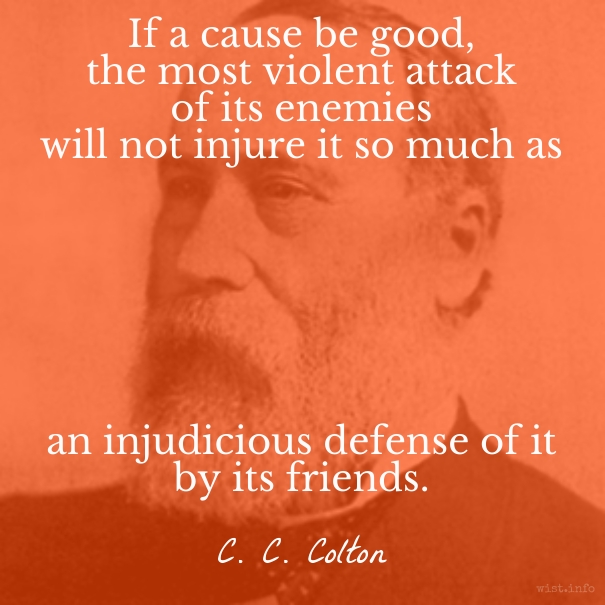Q. Is it ever acceptable to be rude?
A. No. Now, that doesn’t mean you have to let people walk all over you. Etiquette does not render you defenseless. If it did; even I wouldn’t subscribe to it. But rudeness in retaliation for rudeness just doubles the amount of rudeness in the world.
Judith Martin (b. 1938) American author, journalist, etiquette expert [a.k.a. Miss Manners]
Interview (2011-08), “Q and A with Miss Manners,” by Arcynta Ali Childs, Smithsonian magazine
(Source)
Quotations about:
self-defeating
Note not all quotations have been tagged, so Search may find additional quotes on this topic.
Desire to appear clever often prevents our becoming so.
[Le désir de paraître habile empêche souvent de le devenir.]
François VI, duc de La Rochefoucauld (1613-1680) French epigrammatist, memoirist, noble
Réflexions ou sentences et maximes morales [Reflections; or Sentences and Moral Maxims], ¶199 (1665-1678) [tr. Tancock (1959)]
(Source)
Found in the 1st (1665) ed. In manuscript, it added:... parce qu’on songe plus à le paroître aux autres qu’à être effectivement ce qu’il faut être. [... because we think more about appearing so to others than actually being what we must be.]
The theme of seeming/appearing runs all through La Rochefoucauld's maxims. See also ¶127, ¶134, ¶245, ¶431, ¶457.
(Source (French)). Other translations:The desire to be thought a wise Man, oftentimes hinders ones coming to be really such.
[tr. Stanhope (1694), ¶200]The desire of appearing to be persons of ability often prevents our being so.
[pub. Donaldson (1783), ¶1, ed. Lepoittevin-Lacroix (1797), ¶190]Never are we made so ridiculous by the qualities we have, as by those we affect to have. An affectation of wisdom often prevents our becoming wise.
[ed. Carvill (1835), ¶19]The desire of appearing clever often prevents our becoming so.
[ed. Gowens (1851), ¶208]The desire to appear clever often prevents our being so.
[tr. Bund/Friswell (1871), ¶199; tr. Stevens (1939), ¶199]The desire to appear clever often prevents a man from being so.
[tr. FitzGibbon (1957), ¶199]The desire to seem clever often prevents our being so.
[tr. Kronenberger (1959), ¶199]The desire to appear intelligent, often prevents us from actually becoming so.
[tr. Whichello (2016) ¶199]
Whoseover interrupts the conversation of others to make a display of his own wisdom, certainly betrays his ignorance.
Sa'adi (1184-1283/1291?) Persian poet [a.k.a. Sa'di, Moslih Eddin Sa'adi, Mushrif-ud-Din Abdullah, Muslih-ud-Din Mushrif ibn Abdullah, Mosleh al-Din Saadi Shirazi, Shaikh Mosslehedin Saadi Shirazi]
Gulistān [Rose Garden, گُلِستان], ch. 8 “Rules for Conduct in Life,” Maxim 82 (1258) [tr. Gladwin (1806)]
(Source)
Alternate translations:Whoever interrupts the conversation of others to display the extent of his wisdom, will assuredly discover the depth of his folly.
[tr. Eastwick (1852), #82]Who interrupts the conversation of others that they may know his excellence, they will become acquainted only with the degree of his folly.
[tr. Burton (1888), #58]Whoever interrupts the conversation of others to make a display of his own fund of knowledge, makes notorious his own stock of ignorance.
[tr. Ross (1900), #96]If any one interrupts the speech of others in order that people may know his stock of learning, they will discover the extent of his ignorance.
[tr. Platts (1904), #86]Those whose conversation has been interrupted by a man trying to show off his intelligence will know him instead by the depth of his ignorance.
[tr. Rehatsek/Newman (2004), #84]
There are certain people who so ardently and so passionately desire a thing, that from dread of losing it they leave nothing undone to make them lose it.
[Il y a de certaines gens qui veulent si ardemment et si déterminément une certaine chose, que de peur de la manquer, ils n’oublient rien de ce qu’il faut faire pour la manquer.]
Jean de La Bruyère (1645-1696) French essayist, moralist
The Characters [Les Caractères], ch. 4 “Of the Heart [Du Coeur],” § 61 (4.61) (1688) [tr. Van Laun (1885)]
(Source)
(Source (French)). Alternate translations:There are those People, who so ardently and passionately desire a thing, that for fear they shall lose it, they leave nothing undone that may surely make 'em lose it.
[Bullord ed. (1696)]There are certain People, who so ardently and passionately desire a thing, that out of fear of losing it, they leave nothing undone to make 'em lose it.
[Curll ed. (1713)]Some so ardently and passionately desire a thing, that out of fear of losing it, they run into Measures which infallibly makes them lose it.
[Browne ed. (1752)]There are some people who are so ardently and resolutely bent on gaining a certain thing that, for fear of losing it, they do everything that is likely to lose it for them.
[tr. Stewart (1970)]
You injure yourself by your own vindictiveness, and give your enemies too great an advantage, if you accuse them of things that are not true, and tell lies in order to disparage them.
[C’est se venger contre soi-même, et donner un trop grand avantage à ses ennemis, que de leur imputer de choses qui ne sont pas vraies, et de mentir pour les décrier.]
Jean de La Bruyère (1645-1696) French essayist, moralist
The Characters [Les Caractères], ch. 11 “Of Mankind [De l’Homme],” § 150 (11.150) (1688) [tr. Stewart (1970)]
(Source)
(Source (French)). Alternate translations:We are reveng'd on our selves, and give our Enemies too much advantage over us, when we say things of them which are not true, and lie to reproach 'em.
[Bullord ed. (1696)]'Tis reproaching our selves, and giving our Enemies too much advantage over us, to say things of them which are not true, and lie to disparage them.
[Curll ed. (1713)]We are vindictive to our own loss, and give the Staff into our Enemies Hands, when we say things of them which are not true, and lie to defame them.
[Browne ed. (1752)]To say things of our enemies which are not true, and to lie to defame them, is to avenge ourselves on ourselves, and give them too great an advantage over us.
[tr. Van Laun (1885)]
Men who want to be feared must necessarily fear the very people who fear them.
[Etenim qui se metui volent, a quibus metuentur, eosdem metuant ipsi necesse est.]
Marcus Tullius Cicero (106-43 BC) Roman orator, statesman, philosopher
De Officiis [On Duties; On Moral Duty; The Offices], Book 2, ch. 7 (2.7) / sec. 24 (44 BC) [tr. Edinger (1974)]
(Source)
(Source (Latin)). Alternate translations:For those who desire to have others be afraid of them, must needs be afraid of those others in their turns.
[tr. Cockman (1699)]For they who desire to become objects of terror to others, must dread those who regard them with fear.
[tr. McCartney (1798)]For it is a necessary consequence, that men fear those very persons by whom they wish to be feared.
[tr. Edmonds (1865)]For it is inevitable that those who wish to be feared should themselves fear the very persons by whom they are feared.
[tr. Peabody (1883)]For men involuntarily fear those whom they intimidate.
[tr. Gardiner (1899)]Those who wish to be feared must inevitably be afraid of those whom they intimidate.
[tr. Miller (1913)]
ENOBARBUS: When valor preys on reason,
It eats the sword it fights with.William Shakespeare (1564-1616) English dramatist and poet
Antony and Cleopatra, Act 3, sc. 13, ll. 240ff (3.13.240-241) (1607)
(Source)
To ruminate upon evils, to make critical notes upon injuries, and be too acute in their apprehensions, is to add unto our own Tortures, to feather the Arrows of our Enemies, to lash our selves with the Scorpions of our Foes, and to resolve to sleep no more.
Thomas Browne (1605-1682) English physician and author
Christian Morals, Part 3, sec. 12 (1716)
(Source)
There is another sort of lies, inoffensive enough in themselves, but wonderfully ridiculous; I mean those lies which a mistaken vanity suggests, that defeat the very end for which they are calculated, and terminate in the humiliation and confusion of their author, who is sure to be detected. These are chiefly narrative and historical lies, all intended to do infinite honor to their author. He is always the hero of his own romances; he has been in dangers from which nobody but himself ever escaped; he as seen with his own eyes, whatever other people have heard or read of; he has had more bonnes fortunes than ever he knew women; and has ridden more miles post in one day, than ever courier went in two. He is soon ridiculed, and as soon becomes the object of universal contempt and ridicule.
Lord Chesterfield (1694-1773) English statesman, wit [Philip Dormer Stanhope]
Letter to his son, #126 (21 Sep 1747)
(Source)
A bad cause seldom fails to betray itself.
James Madison (1751-1836) American statesman, political theorist, US President (1809-17)
The Federalist Papers, #41 (19 Jan 1788)
(Source)
Anger is like the blade of a butcher knife — very difficult to hold on to for long without harming yourself.
Patti LaBelle (b. 1944) American singer, author, actress [stage name for Patricia Louise Holt-Edwards]
Patti’s Pearls: Lessons in Living (2001) [with Laura Randolph Lancaster]
(Source)
Man has no greater enemy than himself. I have acted contrary to my sentiments and inclination; throughout our whole lives we do what we never intended, and what we proposed to do, we leave undone.
Francesco Petrarca (1304-1374) Italian scholar and poet [a.k.a. Petrarch]
(Attributed)
(Source)
Quoted in Johann Georg Ritter von Zimmermann, An Examination of the Advantages of Solitude and of Its Operations, ch. 5 (1783) [tr. F.S. (1808)].
Loserism is when oppressed people sit around and think up reasons why they can’t do something. Well just do it. Thinking up reasons why you can’t is the Establishment’s job.
Florynce "Flo" Kennedy (1916-2000) American lawyer, feminist, civil rights activist
The Pathology of Oppression (unpub.)
Quoted in "Lawyer Flo Kennedy Enjoys Her Reputation as Radicalism's Rudest Mouth," People (14 Apr 1975).
What nobody tells people who are beginners, and I really wish someone had told this to me, is that […] all of us who do creative work, we get into it, and we get into because we have good taste. […] But you get into this thing […] and there’s a gap. For the first couple of years that you’re making stuff, what you’re making isn’t so good. It’s not that great. It’s really not that great. It’s trying to be good, it has ambition to be good, but it’s not quite that good. But your taste, the thing that got you into the game, your taste is still killer. And your taste is good enough that you can tell that what you’re making is kind of a disappointment to you. That you can tell it’s still sort of crappy. A lot of people never get past that phase. A lot of people at that point, they quit. […] The thing I want to tell you is, everybody goes through that. […] It’s totally normal. And the most important possible thing you can do is do a lot of work. Do a huge volume of work. Put yourself on a deadline so that every week or every month you know you’re going to finish one story. […] Because it’s only by actually going through a volume of work that you’re going to catch up and close that gap. And the work you’re making will be as good as your ambitions. […] It’s going to take you awhile. It’s normal to take a while. You just have to fight your way through that.
Ira Glass (b. 1959) American report, radio personality, producer
“This American Life,” Public Radio International (Aug 2009)
(Source)
There are many who find a good alibi far more attractive than an achievement. For an achievement does not settle anything permanently. We still have to prove our worth anew each day: we have to prove that we are as good today as we were yesterday. But when we have a valid alibi for not achieving anything we are fixed, so to speak, for life. Moreover, when we have an alibi for not writing a book, painting a picture, and so on, we have an alibi for not writing the greatest book and not painting the greatest picture. Small wonder that the effort expended and the punishment endured in obtaining a good alibi often exceed the effort and grief requisite for the attainment of a most marked achievement.
Eric Hoffer (1902-1983) American writer, philosopher, longshoreman
Passionate State of Mind, Aphorism 181 (1955)
(Source)
Most people would succeed in small things if they were not troubled with great ambitions.
Nobody will ever deprive the American people of the right to vote except the American people themselves — and the only way they could do this is by not voting.
Franklin Delano Roosevelt (1882-1945) American lawyer, politician, statesman, US President (1933-1945)
Radio Broadcast (1944-10-05)
(Source)
I don’t believe in twisting yourself into knots of excuses and explanations over the food you make. When one’s hostess starts in with self-deprecations such as “Oh, I don’t know how to cook …,” or “Poor little me …,” or “This may taste awful …,” it is so dreadful to have to reassure her that everything is delicious and fine, whether it is or not. Besides, such admissions only draw attention to one’s shortcomings (or self-perceived shortcomings) and make the other person think, “Yes, you’re right, this really is an awful meal!” Maybe the cat has fallen into the stew, or the lettuce has frozen, or the cake has collapsed — eh bien, tant pis!
Julia Child (1912-2004) American chef and writer
My Life In France, “Le Cordon Bleu,” sec. 2 (2006)
(Source)
"Oh well, too bad."
“I have been Foolish and Deluded,” said Pooh, “and I am a Bear of No Brain at All.”
“You’re the Best Bear in All the World,” said Christopher Robin soothingly.A. A. Milne (1882-1956) English poet and playwright [Alan Alexander Milne]
Winnie-the-Pooh, ch. 3 “Pooh and Piglet Go Hunting” (1926)
(Source)























